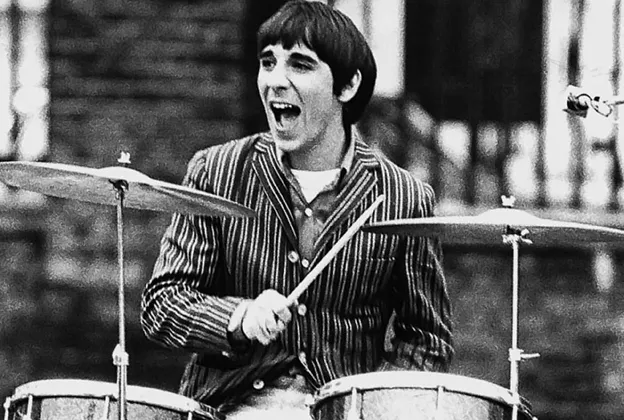Keith Moon blazed across the musical landscape like a shooting star, a luminous force that burned out all too quickly. Departing from this world at the tender age of 31 in 1978, he left behind a legacy that would eternally reverberate through the corridors of rock history. Despite not conforming to the mold of a technically meticulous drummer or showing much interest in honing his skills, Moon’s impact not only stirred the souls of aspiring musicians in the years to come but also paid homage to a select group of revered players from the past.
Moon, an enigmatic drummer, stood apart in his approach. While many musicians dedicated their lives to the pursuit of technical excellence, he veered off the beaten path. His love for the drums transcended the confines of technical precision; it was a passion for music, for the uproarious cacophony, and the unrestrained chaos that defined the rockstar lifestyle. The drums became an extension of his hedonistic ardor, a conduit for expressing the unbridled energy that coursed through him.
This distinctive flair manifested in Moon’s playing, a wild and almost primal style that gained notoriety as The Who ascended to greater heights. Legend has it that Moon’s frenzied drumming inspired the creation of the Muppets character, Animal, with his flailing arms and unbridled pursuit of sheer noise. Rather than adhering to the conventional role of a drummer holding down the rhythm, Moon rebelled against technical constraints, choosing instead to be swept away by the music alongside his fellow bandmates.
Unconcerned with claiming the title of the world’s best drummer, Moon happily declared himself as the unparalleled “world’s best Keith-Moon-type drummer.” His disdain for drum solos stemmed from his belief that they detracted from the collective identity of a musical group. In Moon’s eyes, music was a holistic experience, not a mere sum of individual parts.
While he professed not to have a favorite drummer, Moon acknowledged a few players he admired, even if they didn’t necessarily inspire him. Early on, he received drumming lessons from Carlo Little, drummer for Screaming Lord Sutch, a fellow purveyor of loud and contemporary beats. Moon’s musical education remained rooted in the realms of pop, rock, and the cooler facets of jazz, avoiding the intricate realms of technical jazz or classical drumming.
As he reminisced about his early musical influences in the 1950s, Moon’s memories were punctuated by the sounds of Elvis Presley, with D.J. Fontana, Elvis’s original drummer, earning his admiration as a standout player. Moon’s respect extended to rock drummers like Eric Delaney and Bob Henrit from Argent, while jazz made a subtle entry into his sphere with a nod to the technical perfection of Joe Morello. Despite acknowledging Morello’s prowess, Moon never felt compelled to emulate his technical prowess.
Elevated to legendary status, Moon now shares a hallowed space with his musical idols among the finest players the world has ever witnessed. While they may represent trained and technical mastery, The Who’s drummer brought an unparalleled spirit to the musical tableau, leaving an indelible mark on the annals of rock history.
